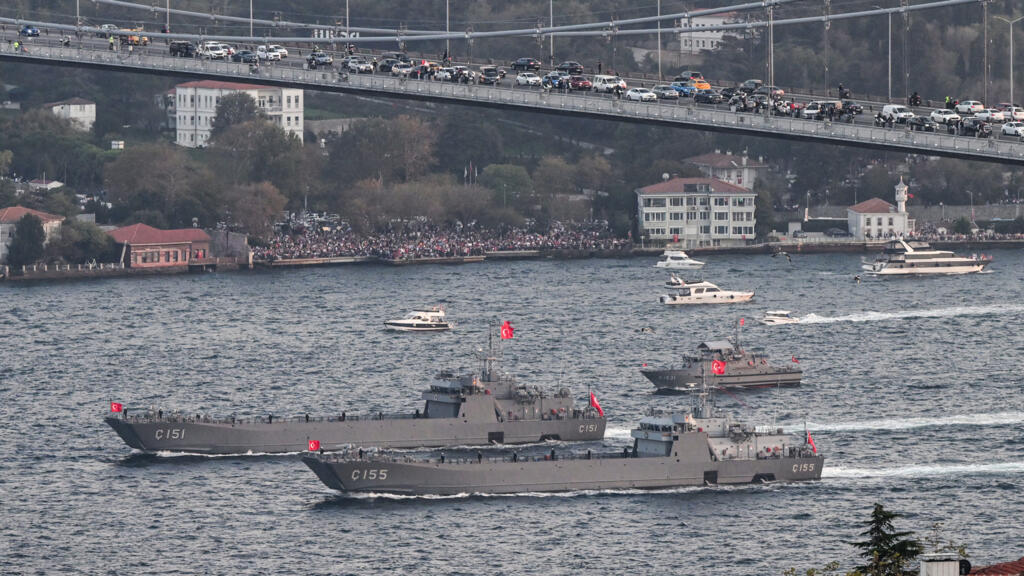Turkey and Egypt's joint naval drill signals shifting Eastern Med alliances
Issued on:
As efforts continue to resolve Israel’s war in Gaza, the conflict is threatening to destabilise the wider region. A rare joint naval exercise between once-rivals Turkey and Egypt is being seen as a warning to Israel, as long-standing alliances shift and new rival partnerships take shape across the Eastern Mediterranean.

After a 13-year break, Turkish and Egyptian warships last week carried out a major naval drill in the Eastern Mediterranean.
The exercise is the latest step in repairing ties after years of tension that began when Egyptian President Abdel Fattah al-Sisi ousted Mohamed Morsi, a close ally of Turkish leader Recep Tayyip Erdogan.
“It marks the consolidation of the improvement in relations,” said Serhat Guvenc, professor of international relations at Kadir Has University in Istanbul, adding the drill sent “a powerful message to Israel of a new alignment”.
Guvenc said naval drills in the eastern Mediterranean have typically involved Cyprus, Greece and Israel, but this time Egypt broke with those countries, signalling it was no longer part of the anti-Turkey camp in the region.
Erdogan’s Washington visit exposes limits of his rapport with Trump
Shift in alliances
The Turkish-Egyptian exercise follows years in which Cairo built strong ties with Ankara’s rivals in the region. The shift has not gone unnoticed in Israel.
“Definitely, this is a major event that Turkey and Egypt have conducted a naval exercise after so many years,” said Gallia Lindenstrauss, an Israeli foreign policy specialist at the Institute for National Security Studies in Tel Aviv.
The joint drill comes as Ankara has expanded and modernised its navy in recent years. Lindenstrauss said this has unsettled some of Turkey’s neighbours, giving Israel common ground with Greece and Cyprus.
“Some of them also have quite big disputes with Turkey, such as Cyprus and Greece,” she said. “Greece and Cyprus relations with Israel have been developing since 2010. We’ve seen a lot of military drills together. We saw weapons procurements between the three actors, and this has been going on for some time. So Israel is not alone.”
Turkey has long-standing territorial disputes with Greece and the Greek Cypriot government in the Aegean and the Mediterranean.
Guvenc said Israel has gained the upper hand over Turkey in their rivalry centred on Cyprus.
"The Greek Cypriots acquired a very important air defence system from Israel and activated it. They made life far more difficult for the Turkish military, in particular for the Turkish Air Force," he said.
"This gives you an idea about the shifting balance of power in the Eastern Mediterranean as a result of Israel taking sides with Cyprus and Greece."
Macron and Erdogan find fragile common ground amid battle for influence
Tensions over Gaza
Despite those rivalries, Turkey and Egypt are finding common ground in their opposition to Israel’s war in Gaza and in wider concerns over Israel’s growing regional power.
In September, Sisi reportedly called Israel an enemy.
“There is competition over who is the most dominant and important actor in the Middle East, in the Muslim world in general,” said Lindenstrauss.
“I really can’t imagine a unified Turkish and Egyptian action against Israel. I can imagine them cooperating to pressure Israel to change its position, which is what is happening now.”
Cairo and Ankara remain at odds over Libya, where they back rival governments. But analysts warn that the fallout from the Gaza conflict is increasingly shaping the region’s power calculations.
Guvenc said the outcome of peace efforts could determine the future balance in the Mediterranean.
“We see an alignment of Greece, Greek Cypriots and Israel. But once the Gaza issue is tackled, from an Israeli perspective, Turkey is strategically more important than these two countries,” he said.
“But if the strategic makeup of the region may not secure a solution, we may see deterioration in the general situation. Then outside actors will be invited by one side or the other, such as Russia, China or even India, to further complicate the issue.”
Daily newsletterReceive essential international news every morning
Subscribe